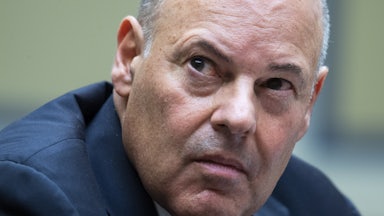As perhaps the second-most conservative member of a Democratic Senate caucus that can’t afford to lose a single vote to pass its agenda, Arizona’s Kyrsten Sinema has a great deal of leverage. Despite her power within the caucus, and despite her record of pointedly staking out her independence from her party, Sinema has been fairly quiet as the razor-thin majority prepared to pass a massive Covid-19 relief and economic stimulus bill.
Now she has begun talking. In a rarish interview with Politico, Sinema announced her opposition to including a proposal to raise the hourly minimum wage (gradually) to $15 in the relief bill. “What’s important is whether or not it’s directly related to short-term Covid relief. And if it’s not, then I am not going to support it in this legislation,” she told Politico’s Burgess Everett.
Centrist Democrats representing vulnerable seats have a very strange tendency to search for reasons not to have to do popular things. It would be understandable if moderates like Sinema refused to follow the party when it pursued unpopular or controversial goals, but in real life, the reverse happens regularly. Prior to Sinema coming out against the wage proposal, her fellow conservative Democrat Joe Manchin publicly waffled on the wildly popular proposal to send Americans $2,000 stimulus checks.
In this case, hiking the minimum wage is not only nationally popular; it is almost definitely more popular than the senator herself in her home state of Arizona. Both were on the ballot recently, in fact. In 2016, Arizonans voted on Proposition 206, which raised the state minimum wage to $12. It passed with nearly 60 percent of the vote, a far greater percentage than either Donald Trump or Hillary Clinton received that year. Two years later, Sinema would win her first statewide election by about eight points less than the wage hike measure received. Hundreds of thousands more Arizonans voted to raise the minimum wage than to make Kyrsten Sinema a senator. The idea that she would sink a proposal to do the same on procedural grounds should make no political sense at all.
Now I should be clear that Sinema isn’t officially opposing the idea of raising the minimum wage. She is arguing that it shouldn’t be done in the Covid-19 relief package. That certainly sounds reasonable—and it would make perfect sense if Sinema didn’t also oppose eliminating the legislative filibuster rule. As she explicitly told Politico, “I want to restore the 60-vote threshold for all elements of the Senate’s work.” Her position, then, is that regardless of what the minimum wage should be, in an ideal world, the Democrats should not be able to raise it. (She’d likely quibble with this characterization, but if your position is that Democrats should find a way to pass a minimum wage hike with 10 Republican votes, your position is that Democrats shouldn’t pass a minimum wage hike.)
It is irksome to read any piece of journalism premised on access to a powerful figure in which the reporter does not appear to have challenged any of their subject’s dubious or contradictory statements. One finds oneself arguing with the text, and wondering why the author didn’t raise the same issues. Reading a senator stating a desire to “restore” a “60-vote threshold for all Senate business” makes one want to know what she believes the origin and purpose of that threshold to be, and how it came to be a sacred Senate tradition despite not being in place for most of Senate history.
Some of what Sinema says seems designed to irritate liberals—again, many congressional moderates seem to prefer aggravating the left to using their leverage to do popular things—so statements like, “It’s not effective to pressure me on anything” should come as no surprise. This is the voice of a person who wants to determine the limits of what is currently politically possible, and who believes she has the power to do so.
I don’t think Joe Biden—who is so instinctively cautious that he seemed to preemptively throw in the towel on getting the minimum wage raised through reconciliation last week—wants to force Sinema into a “tough” vote this early on. But his feelings about whether Democrats can or will use reconciliation to raise the minimum wage matter less than those of Senator Bernie Sanders (who is taking the lead on the proposal as chairman of the budget committee), Senate Majority Leader Chuck Schumer, and Vice President Kamala Harris.
Sinema, I think, is going public in order to get Schumer and the rest to join Biden in preemptively conceding. Because—here’s the good news—she does not actually have the power to sink the measure by withholding her support, unless she is willing to vote against the entire relief bill, thus killing it.
The budget reconciliation process is a way to pass legislation with a simple majority in the Senate. There are certain arcane rules about what kinds of bills can and can’t be passed through this process. It is the job of the Senate parliamentarian (currently Elizabeth MacDonough) to advise the Senate on whether any given piece of legislation follows or breaks those rules. The parliamentarian may decide, as Sinema has, that the minimum wage hike doesn’t qualify as something that could be passed through reconciliation. And if that happens? “There is no instance in which I would overrule a parliamentarian’s decision,” Sinema told Politico. So Sinema’s position is clear. Less clear is why she thinks it matters.
Here’s what I mean: If the parliamentarian rules against including the minimum wage proposal in reconciliation, and Democrats decide to overrule the parliamentarian, Sinema would still be unable to block its inclusion in the bill. The parliamentarian has no official power; the vice president, as president of the senate, decides whether to overrule the parliamentarian. It then takes 60 votes to overrule the vice president’s decision.
In other words, if the parliamentarian rules that the wage hike shouldn’t be in the bill (which is far from a given), and the vice president overrules her, Sinema couldn’t stop Harris. Even if she got Joe Manchin and Angus King and Mark Kelly and Jeanne Shaheen on board, they would not be able to block the inclusion of the minimum wage proposal. Their only other option would be to sink the entire package over one of its most popular elements.
Kyrsten Sinema is bluffing. It’s a bluff Chuck Schumer, Joe Biden, and Kamala Harris should call.








